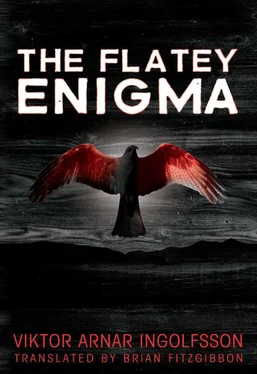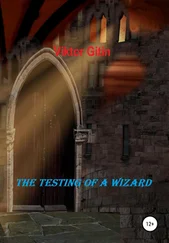Viktor Ingolfsson - The Flatey Enigma
Здесь есть возможность читать онлайн «Viktor Ingolfsson - The Flatey Enigma» весь текст электронной книги совершенно бесплатно (целиком полную версию без сокращений). В некоторых случаях можно слушать аудио, скачать через торрент в формате fb2 и присутствует краткое содержание. Жанр: Триллер, на английском языке. Описание произведения, (предисловие) а так же отзывы посетителей доступны на портале библиотеки ЛибКат.
- Название:The Flatey Enigma
- Автор:
- Жанр:
- Год:неизвестен
- ISBN:нет данных
- Рейтинг книги:5 / 5. Голосов: 1
-
Избранное:Добавить в избранное
- Отзывы:
-
Ваша оценка:
- 100
- 1
- 2
- 3
- 4
- 5
The Flatey Enigma: краткое содержание, описание и аннотация
Предлагаем к чтению аннотацию, описание, краткое содержание или предисловие (зависит от того, что написал сам автор книги «The Flatey Enigma»). Если вы не нашли необходимую информацию о книге — напишите в комментариях, мы постараемся отыскать её.
The Flatey Enigma — читать онлайн бесплатно полную книгу (весь текст) целиком
Ниже представлен текст книги, разбитый по страницам. Система сохранения места последней прочитанной страницы, позволяет с удобством читать онлайн бесплатно книгу «The Flatey Enigma», без необходимости каждый раз заново искать на чём Вы остановились. Поставьте закладку, и сможете в любой момент перейти на страницу, на которой закончили чтение.
Интервал:
Закладка:
The church bells rang again, and people squeezed through the narrow doors. Kjartan felt this was a completely different building to the one that he and Johanna had stepped into to examine the body in the casket just a few days ago. He hadn’t taken the time to look around it back then. There were many candles glowing here now, and the altarpiece had come to life-a beautiful fresco of Jesus and two of his disciples painted in the same style as the picture cards he used to get at Sunday school when he was a kid. Grimur ushered him onto a pew where he sat beside Sigurbjorn the farmer. Gudjon had obviously finished cutting his hair after Kjartan had left them, but it was still a bit uneven over his cheeks. Kjartan involuntarily started to study the necks of the people sitting in front of him. A gallery of heads extended before him. Different stages of baldness and hairdos had been executed with varying degrees of success, and most of the women had plaits. Everyone was spic-and-span, and a strong scent of soap fused with the faintly stale air of the church. Sigurbjorn gave off a faint odor of alcohol and seemed to be half hungover.
The organ now sounded from the balcony, and the choir launched into the psalm. Kjartan listened and found the music strangely soothing. This might not have been the best choir in the land, but there was a pleasant harmony between the singing and the organ.
Reverend Hannes emerged from the sacristy and turned to the congregation. He coughed twice and said, “Dear parishioners, brothers and sisters, I would like to start this holy ceremony by giving you the sad news that Bjorn Snorri Thorvald, the father of our good doctor, Johanna, passed away in his sleep last night. As you all know, the old man had been very ill for some time, and now the good Lord has called him back to Himself and put an end to his suffering. His loving daughter was sitting by his side when the call came, and I went there this morning to commend his spirit to God. The removal will be on Tuesday and the funeral on Wednesday. Let us join our hands in prayer.”
The congregation bowed their heads, and the priest led the prayer. Kjartan wondered whether the doctor was at the mass. The entire population of the islands seemed to have crammed into the church. He swiftly scanned the congregation but could see no sign of Johanna anywhere. At the very back of the church, however, he saw little Nonni of Ystakot standing up and sneaking out through the open church door. Yes, he probably would have done the same himself if he’d been given half a chance. It was swiftly getting hot and stuffy in there.
The organ erupted, and another psalm was sung.
Question fifteen: Cut in two by the prow of a ship. First letter. Sorli’s Tale narrates how Hedin, the king’s son, was slain by a spell. Blinded by magic, he allowed King Hogni’s queen, Hervor, to be taken and placed in front of the prow of his ship, so that she was cut in two when the ship was launched. Hedin and Hogni then fought in a duel. It is said that there was so much evil attached to this curse that even when they had sliced each other in two from the shoulder down, they were able to stand up again and fight as before. A hundred and forty years were to pass before one of King Olaf’s courtiers broke this pitiful spell. The answer is “Hervor,” and the first letter is h.
CHAPTER 32
Fridrik Einarsson didn’t seem particularly pleased to be visited by Detective Dagbjartur on a Whitsunday afternoon for the second time in two days. Nevertheless, he invited him in and offered him a seat, but he anxiously glanced at his watch.
“My wife and I are off to a wedding. I don’t want to be late,” he said.
Dagbjartur tried to keep it brief: “We compared the list you made of Gaston Lund’s Icelandic acquaintances and another list of the inhabitants of Flatey, which we got back from them yesterday. Bjorn Snorri Thorvald’s name appears on both lists.”
“Yes,” Fridrik answered. “I could have told you that straightaway yesterday. I knew that Bjorn Snorri and his daughter Johanna were there on the island, but I couldn’t see how that was relevant. I heard on the radio at lunchtime that Bjorn Snorri just passed away. My old colleagues seem to be fading.”
“Did Bjorn Snorri and Gaston Lund get along?”
Fridrik looked at Dagbjartur in bewilderment. “How do you mean?”
“You said that the professor sometimes got into arguments about manuscripts with his Icelandic acquaintances.”
Fridrik smiled. “Bjorn Snorri didn’t argue about the manuscripts. He was one of the few Icelanders who was virtually indifferent to where the manuscripts should be preserved. He just wanted to know they were in a good place and that there was easy access to them…”
Fridrik suddenly shut up and frowned. “Easy access to them,” he repeated hesitantly, lost in some thought.
Dagbjartur sensed there was more to this and calmly waited for Fridrik to continue. “But that was the problem. Bjorn Snorri lost his job in Copenhagen at the end of the war and was barred from accessing the manuscripts after that. I remember very well how unhappy he was with his Danish colleagues, including Lund. He’d been thrown out of the house with unnecessary force. But those were special times at the end of the war, and a lot of errors were made as a result of pent-up anger. My family and I took the father and daughter in some days after he was fired, and they came home with us to Iceland a few weeks later. Johanna and Einar, my youngest son, were half engaged in high school until Einar died in a sudden accident.”
Fridrik’s voice faltered a moment before continuing: “I think Bjorn Snorri must have gotten over his misfortune in Copenhagen, but he was ill for many years. I imagine it’s the cancer that finally crushed him.”
“Can you describe Bjorn Snorri a little bit better for me?” Dagbjartur asked.
Fridrik reflected a moment before starting: “Bjorn Snorri had a particularly sharp mind. He was a great scholar, and few contemporaries could stand up to him when it came to his knowledge of Icelandic manuscripts. Instead of focusing on the text, he started off by forming a picture of the scribes. By placing himself in their shoes, he could guess which manuscripts they were copying. Was the scribe in the habit of cutting his quill as he was leafing through a manuscript? When was the scribe in the best form, at the beginning of the work or later? Was there a greater danger of making mistakes at certain times? Did he think the text was fun and did this make him rush the work so that he could swiftly move on? Or was the text boring and did that give him cause to labor on the calligraphy and adorn the letters? In what environment did he learn his craft, and what were his specialized skills? Bjorn Snorri tried to form a picture of these men for himself and look over their shoulders as they were working, as it were. But he was so absorbed by his quest to define these many centuries-old acquaintances of his that he neglected the present. His contemporaries were too close to him for him to give himself the time to consider them. He never asked anyone how they were today. Instead, he could trace back various versions of the same paragraph in different manuscripts and talk about their evolution from the perspective of the personal characteristics of each scribe. But he was incapable of relating to the circumstances of his fellow travelers in space and time. He just assumed that if anyone had any issue to raise with him they would step forward and say so. Body language and gestures were simply beyond his understanding. The mundane faded into insignificance when he was struggling to analyze and understand a seven-hundred-year-old margin label on a torn vellum manuscript. He accumulated enormous knowledge. And he needed an outlet for that. He was a writer of only average ability and compiling reports bored him, but he could stand and talk about his interests for hours on end. And he could speak all the Nordic languages with ease. German came to him quite easily, too. He used his lectures to formulate his opinions and findings, put some order into them, and place them in a logical context. Talking was, therefore, the final phase in the formulation of his theories, and it didn’t matter to him whether anyone was listening or not. If the issue was above the heads of the university students who sat with him, then he would just talk to himself or the one listener who was always close by and never flinched, little Johanna. And he used the time to explore new angles on his subject matter and could even make original discoveries in the middle of lectures in unknown cities. But as soon as that was all taken away from him, he withdrew into himself. He couldn’t find peace anywhere, because he’d lost his outlet in the mundane world. He sank into depression and numbed his pain with alcohol. It could only end in one way.”
Читать дальшеИнтервал:
Закладка:
Похожие книги на «The Flatey Enigma»
Представляем Вашему вниманию похожие книги на «The Flatey Enigma» списком для выбора. Мы отобрали схожую по названию и смыслу литературу в надежде предоставить читателям больше вариантов отыскать новые, интересные, ещё непрочитанные произведения.
Обсуждение, отзывы о книге «The Flatey Enigma» и просто собственные мнения читателей. Оставьте ваши комментарии, напишите, что Вы думаете о произведении, его смысле или главных героях. Укажите что конкретно понравилось, а что нет, и почему Вы так считаете.











